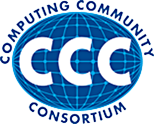Computing Community Consortium (CCC) Workshop
New Forms of Industry - Academy Partnership in CPS Research
May 19, 2009
Room 103, Innovation Hall
George Mason University
Fairfax, Virginia, 22030
Background
Broad-based technological and economic drivers have been rapidly transforming industrial products into Cyber-Physical Systems (CPS), in which computing and networking is deeply and inextricable integrated with physical system components and processes. This industrial transformation is pervasive in all systems industries from human- to societal-scale and spans a wide range of industrial sectors from transportation to energy and to health-care. CPS establishes a hugely important new role for Networking and Information Technology (NIT) and defines new classes of challenges for Computer and Information Science and Engineering.A crucial element of the CPS initiative has been the strong industrial support from a diverse group of companies. At the National Industry Roundtable in May 2007, the participants pointed out that CPS is a fundamental concern for the future competitiveness of their industries and they face fundamental scientific and technology challenges in the design of their next generation systems. The discussions made abundantly clear that CPS is a real, emerging and defining scientific and technology challenge of the 21st century.
Workshop Objectives
The objective of the Workshop is the discussion of industry - academy partnerships and collaboration in CPS research. The discussions should take into consideration the following challenges:- There is a traditional distinction between academic and industrial R&D research: academic institutions conduct precompetitive, long term research funded mostly by government, while industry is engaged in short term, self-funded (IR&D) or contract (CR&D) activities.
- The separation of academic and industry research is counterproductive in CPS due to the strong need for new fundamentals to address the significant application pull. Industrial applications continuously produce a host of unsolved problems that are hard and real. Alignment of academic research and industry needs serves the interest of both communities.
- Existing forms of industry- academy research coordination often have reduced effectiveness because of barriers caused by size, legal constructs, and governance issues.
Expected Outcome
The expected outcome of the Workshop is a set of recommendations for effective forms of industry/academy collaborative research that can address the challenges above. Findings and specific recommendations will be summarized in a White Paper that will be distributed to Government Agencies and made accessible to the public.